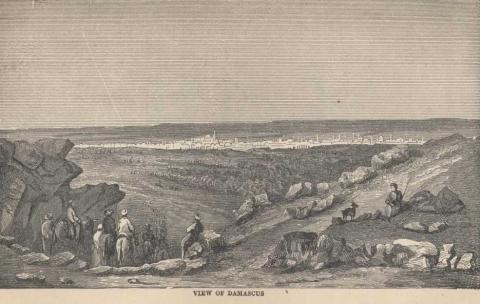Beirout, September 10, Tuesday The Quaker City has arrived in Beirout, Lebanon. The tourists were broken up into groups, Mark Twain's group was to take 'the long trip"
Well, out of our eight, three were selected to attend to all business connected with the expedition. The rest of us had nothing to do but look at the beautiful city of Beirout, with its bright, new houses nestled among a wilderness of green shrubbery spread abroad over an upland that sloped gently down to the sea; and also at the mountains of Lebanon that environ it; and likewise to bathe in the transparent blue water that rolled its billows about the ship (we did not know there were sharks there.) We had also to range up and down through the town and look at the costumes. These are picturesque and fanciful, but not so varied as at Constantinople and Smyrna; the women of Beirout add an agony—in the two former cities the sex wear a thin veil which one can see through (and they often expose their ancles,) but at Beirout they cover their entire faces with dark-colored or black veils, so that they look like mummies, and then expose their breasts to the public. A young gentleman (I believe he was a Greek,) volunteered to show us around the city, and said it would afford him great pleasure, because he was studying English and wanted practice in that language. When we had finished the rounds, however, he called for remuneration—said he hoped the gentlemen would give him a trifle in the way of a few piastres (equivalent to a few five cent pieces.) We did so. The Consul was surprised when he heard it, and said he knew the young fellow’s family very well, and that they were an old and highly respectable family and worth a hundred and fifty thousand dollars! Some people, so situated, would have been ashamed of the berth he had with us and his manner of crawling into it.
See Handbook for Travellers in Syria and Palestine, Murray 1858.
Bædeker's account are from a later date but descriptions may still be useful: Palestine and Syria, (1876)
